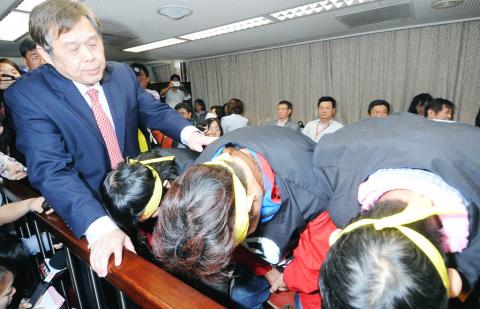|
Minister faces furor over ‘inaction’
toward protests
By Alison Hsiao / Staff reporter

Laid-off workers ignore Council
of Labor Affairs Minister Pan Shih-wei, left, by bowing down during a meeting of
the Legislative Yuan’s Social Welfare and Environmental Hygiene Committee in
Taipei yesterday.
Photo: Wang Min-wei, Taipei Times
Council of Labor Affairs Minister Pan
Shih-wei (潘世偉) yesterday faced a barrage of accusations from lawmakers in the
legislature’s plenary session over what legislators called his “inaction” and
“indifference” toward protesters on hunger strike outside the council’s
headquarters in Taipei.
Four protesters, who were on their 10th day of a hunger strike, were present at
yesterday’s session to confront the minister, who had not met with them during
the past week and reportedly said in an interview — contrary to fact — that the
hunger strike was already over.
The protesters are being sued by the government for not repaying loans which
were granted to cover their pensions and severance pay after being laid off by
their bankrupt employers in 1997.
They ended the strike yesterday evening.
Democratic Progressive Party legislators Chao Tien-lin (趙天麟) and Liu Chien-kuo
(劉建國) asked Pan why he had not visited the protesters camping outside his
office.
When Pan replied that he had been “always looking after them,” Chao promptly
replied that Pan was “always looking through surveillance monitors.”
When Liu asked Pan to name which of his colleagues had visited the protesters,
as the minister said they had, Pan was not able to do so.
Huang Te-pei (黃德北), who was on hunger strike until two days ago and who was
invited to talk at the session, said he never saw any official visit the
protesters while he was there.
Huang said that since Tuesday last week, the council had been dispatching staff
to the protesters’ work places, without the protesters’ knowledge, to either
introduce an official discount package to or to pressure protesters’ family
members.
“What these agents are doing is asking the workers to clean the debt,
substantially offset by government-offered sweet discounts. However, what they
are not able or entitled to do is answer the major political question, which is
whether these debts are to be repaid by the workers,” Huang said.
The source of controversy lies in that while then-council minister Hsu Chieh-kui
(許介圭) sought to placate the workers, saying that the loans were to be repaid by
the employers, not the laid-off workers (as some subsequent council officials
had suggested), on paper the debtors are the workers and the former employers
are not mentioned.
Since the beginning of the protest movement to urge the government to drop the
lawsuit against the workers last year, Pan has repeatedly emphasized that the
government did not promise to collect the workers’ debt from the bankrupt
employers and that the workers would have substantial discounts on the loans.
Taipei Confederation of Trade Unions secretary Chen Shu-lun (陳淑綸) refused the
subsidies and said it was like the government was “offering a medication patch
after punching you in the face.”
DPP Legislator Tien Chiu-chin (田秋堇) said it was not difficult to see that the
“loans” provided to the workers were actually their retirement and severance
pay, since the amounts wired to their bank accounts were not round numbers, such
as 801,438.
Lee Chih-feng (李志峰), a laid-off worker and representative at the session, said
that at the time even an 88-year-old, illiterate and disabled family member
could serve as guarantor for his “loan.”
DPP Legislator Lin Shu-fen (林淑芬) demanded that the council withdraw the lawsuit
immediately, accusing the government of being generous to the former employers,
but harsh on the workers.
Chinese Nationalist Party (KMT) legislators Alicia Wang (王育敏) and Su Ching-chuan
(蘇清泉), while lambasting the council for suing the workers, asked Pan whether it
was possible that “outside forces” had caused the dealings to be obstructed and
become convoluted.
In response, the protesters said this kind of language was reminiscent of the
Martial Law era, when such phrases were used to drive a wedge between labor
groups.
|
![]()
![]()
![]()